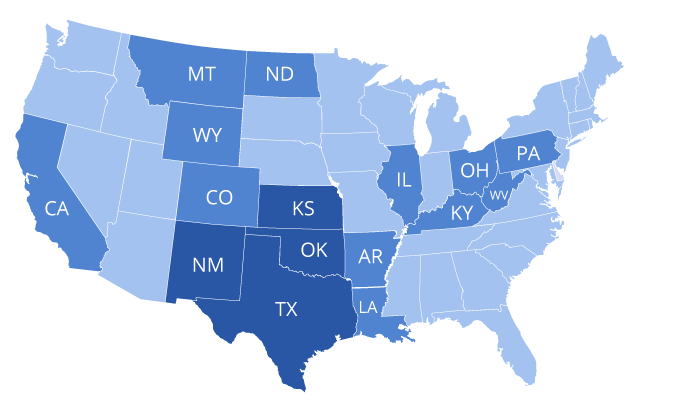Learn About Your Mineral Rights
There are five ways to learn about your oil and gas mineral rights: YouTube, ChatGPT, Forums, organizations, and learning by doing!
Sell Your Mineral Rights (Request an Offer):
Top Resources
Drinking From the Firehose
As a new mineral owner, learning about your oil and gas mineral rights might feel like drinking from a firehose. That’s okay – it gets better. These five resources will help you better understand what you own and manage your minerals effectively.
YouTube
YouTube can be a wealth of information. Of course, we are partial to our own education-focused channel, Blue Mesa Minerals where you’ll find information on a variety of topics related to the ownership of mineral rights.
NARO
The National Association of Mineral Owners (NARO) is another wonderful resource. NARO focuses on educating minor owners and fighting for their interests through legislative efforts.
The Mineral Rights Forum
The Mineral Rights Forum, although not nearly as good at it used to be, is still a great way to interact with other mineral owners and get answers to your questions.
Learn by Doing
Experience is the best teacher, so one of the best ways to learn is just to jump in and start doing whatever needs to be done. Start where you’re at (figuring out what you own, transferring ownership, negotiating a lease, etc).
Start Here
4 Ways to Learn About Your Mineral Rights
You can learn about your mineral rights through YouTube videos, by collaborating with other mineral owners, at conferences, with ChatGPT, or by jumping in and learning as you go.
Four Learning Resources
This video goes over four ways to learn about your oil and gas mineral rights.
YouTube
YouTube is a great resource for learning just about anything. Of course, we are partial to our channel which provides educational content on various aspects of owning mineral rights.
ChatGPT
Artificial Intelligence, such as ChatGPT, can answer questions, explain concepts, and interpret legal documents.
Forums & Organizations
The Mineral Rights Forum and the National Association of Royalty Owners (NARO) are both great learning resources and can connect you with other, more experienced, mineral owners.
Experience is the Best Teacher
As they say, experience is the best teacher. So, wherever you are on this journey, just dive in and start somewhere, even if that’s just trying to figure out what you own.
Interactive & Free
Learn from AI
Artificial intelligence (AI), like ChatGPT, can be an incredible resource for mineral owners.
Answer Questions
ChatGPT can answer questions such as “What is a net mineral acre?” or “How do I calculate net mineral acres”? It can also explain most concepts related to your oil and gas mineral rights.
Interpret Legal Documents
Simply upload all or part of your legal documents to ChatGPT (redact sensitive personal information) and ask Chat to tell you, in plain English, what the document says.
AI makes it easy to understand your oil and gas lease, division order, or other documents with complex legal language.
Negotiate a Lease
It’s always best to have an attorney negotiate an oi land gas lease for you. However, if your minerals are tiny and you aren’t going to hire an attorney anyway, ChatGPT can be incredibly helpful in drafting legal language to be used in the negotiation.


Focused on Education & Advocacy
National Association of Royalty Owners (NARO)
The National Association of Royalty Owners (NARO) is a wonderful organization focused on educating mineral owners and advocating for their interest in state legislation.
Conferences
NARO has an annual convention as well as several state and region-specific conventions. The conventions are a great place to learn about your mineral rights (beginner and expert alike) and meet other owners.
Training
NARO offers a variety of educational and training resources, including town hall meetings, books, webinars, and classes.
Certification
For those interested in taking their learning to the next level, or managing their family’s mineral rights, NARO offers a Certified Mineral Management (CMM) certification.
Connect with Mineral Owners
Mineral Rights Forum
The Mineral Rights Forum has been around for a long time, but it’s it’s still one of the best ways to connect with other mineral owners in your area.
The forum is organized by topics and locations, so it’s easy to navigate to the state and county where your mineral rights are located. It’s also full of helpful people who would be happy to answer your questions.
Years ago, the moderators crippled the site somewhat, so it can take days or weeks (or longer) to get a post approved. It’s also catering more to mineral buyers now – that used to be something they were very protective against.
Despite the drawbacks, it’s nice to be able to find mineral owners in your area and discuss the latest lease terms.
Learn by Doing
Experience is the best tester, right? So dive right in and learn as you go.
But where do you start?
Start where you are. If you don’t know much, just start asking questions and try the find the answers.
If you just inherited mineral rights, start buy putting together all the documents you have and creating a mineral management spreadsheet.
Not sure where to start? Download the free 2025 Mineral Management Spreadsheet (Google Sheet).
If you just got a call from a landman offering you a lease on mineral rights that you didn’t know you owned? Maybe start by getting documentation from the landman and using ChatGPT and the Mineral Rights Forum to get answers to your questions.
If you want to deed your mineral rights to the next generation, it’s best to have an attorney help you, but there are a lot of documents you can gather in preparation – and this is the perfect time to either teach the next generation, or to learn together!
History and Context
Learn from Family Members
If you’re lucky, you’ll be able to learn from the previous generation. Sometimes, they can be a wealth of information, and they are usually happy to share their knowledge.
However, sometimes the previous owner’s mind isn’t as sharp as it once was, or they might have passed away before teaching you about the mineral rights.
Sometimes, all you have is a shoebox of random documents. Others might have received a whole filing cabinet with 30 years of documents, which is utterly overwhelming. Often, new mineral owners receive nothing and have to start from scratch.
In this case, you might want to contact other family members, such as aunts, uncles, or cousins, who may know more than you and be willing to help. In either case, it’s good to connect with family members who own similar mineral rights so that you can collaborate in the future (maybe splitting legal fees to negotiate a lease).
History and Context
Where We Buy Mineral Rights
We buy both producing and non-producing minerals in all oil and gas states. However, we are especially interested in Texas and Kansas mineral rights.
|
We even buy minerals in more obscure states, which produce very little oil and gas compared to other states.

Valuation Factors
How We Value Mineral Rights
There are many factors that play into the value of mineral rights. These include location, producing vs. non-producing properties, current oil and gas prices, well production figures, lease terms, and even the operator of the well or wells. We also look at the risks of buying and owning minerals that you are interested in selling.
Location
Minerals in the hottest shale plays are more valuable than those in older fields with conventional wells.
Producing vs. Non-Producing
Producing minerals are often worth more than non-producing minerals because they are generating revenue.
Oil & Gas Prices
When oil and gas prices drop, revenue drops, and sometimes operators are unable to continue operating the well.
Production
Highly productive wells (and off-set wells) can increase the value of your minerals.
Lease Terms
Favorable lease terms (such as a 25% royalty reservation) positively impact the value of the leased minerals.
Operator
A small number of operators are unethical, and their reputation automatically devalues your minerals.
Why Sell?
Why People Sell Their Mineral Rights
I am putting my affairs in order. I don’t want to burden my kids with the hassle of transferring ownership and managing small mineral rights. When my sister passed away, my niece and nephew had to hire an attorney to help them with the minerals. I don’t want my kids to go through that.
I inherited my mineral rights so they were sentimental, but I don’t really want to bother with managing them and filing extra tax returns. I decided to sell and use the money as a down payment on my house.
I had no idea how fast the oil production would decline. My checks are only 20% of what they were a few years ago. I should have sold my mineral rights when the wells were brand new and still generating huge royalties.
My oil wells have been producing for decades and the reserves are almost depleted. Once the wells are plugged, the value will be significantly lower. I’d rather cash out now.
I inherited mineral rights, but don’t want to be involved with fracking and fossil fuels. I would prefer to support renewable energy and do my part to reverse climate change.

